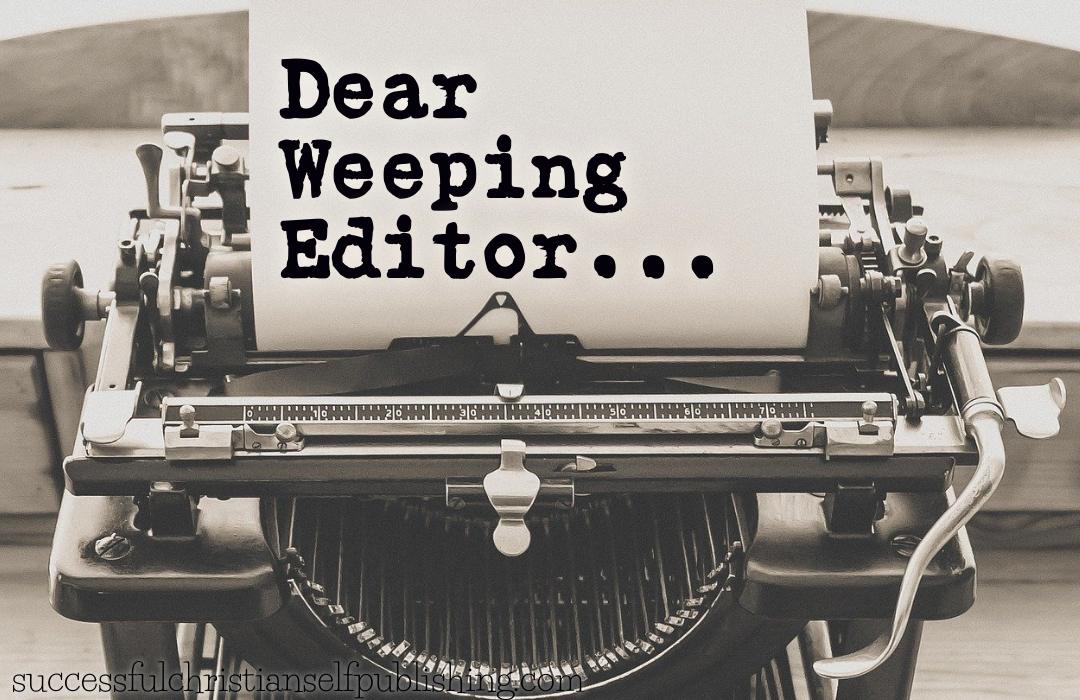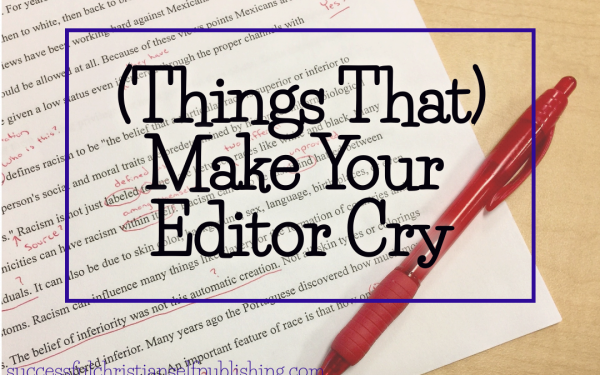Dear Weeping Editor: Sound

Dear Weeping Editor,
As far as I know, the word “sound” is a noun, is it not? However, lately I keep seeing it used as a verb in novels. I think it may be because authors want to use active verbs and avoid the “to be” passive verbs. But phrases like “footsteps sounded in the hall” doesn’t sound (okay, here it’s a verb) right to me. What’s your take?
Signed,
Covering My Ears
Dear Ears,
Thanks for writing. It sure sounds like a dilemma (See what I did there?). Honestly, upon reading the phrase “footsteps sounded in the hall” I wanted to ask, “Oh they sounded did, did they? What did they sound like?”
I think it’s an extremely lazy sentence and, even worse, just plain weak writing. Furthermore, I agree that it’s an awkward usage. I mean, after I get done articling, I thought I might sandwich, then TV before I couch for a while. Yeah.
Technically, though, it may not be wrong even though it isn’t very good writing.
According to Webster, the word “sound” can be a noun, verb, adverb, or adjective. It’s pretty versatile. https://www.merriam-webster.com/dictionary/sound
In terms of the verb(1) definition, it can be a transitive verb (//sound a trumpet, //sound the alarm) or an intransitive verb (//the bugle sounds to battle, //it sounds good to me).
(NOTE: The verb(2) definition doesn’t apply.)
The closest I get to your example “footsteps sounded in the hall” would be that sense of the word sound as an intransitive verb under the verb(1) definition. Wester says:
1a : to make a sound
b : RESOUND
c : to give a summons by sound
I can barely imagine substituting “resounded” for “sounded” in your example so that “footsteps sounded in the hall” becomes “footsteps resounded in the hall.” I can also barely see replacing their example sentence with the past tense (//the bugle sounded to battle). I’m just not sure that the footsteps are really “resounding,” or “summoning” a hallway, so I’m not even convinced it works in that sense, but I suppose it could barely squeak by if some nitpicker wanted to vigorously defend it.
But here’s the thing. As a writer, you have to try to describe (SHOW) all seven senses when you write. Readers want to experience what your characters see, smell, hear, taste, touch and any variances in their proprioception sense or vestibular sense. Good writers include tons of sensory details in ways that actively envelop the reader, not in ways that pull the reader out of the story.
With the example you provide, we are basically talking about the sense of hearing. If we were describing the sense of smell would we ever write something like, “sizzling bacon odored in the kitchen” or “fresh cut flowers fragranced in the greenhouse”? Of course not. It’s more obviously awkward and lazy. But we can say a noise “sounded” in the hall and blithely move on to the next sentence? Yeah. I don’t like it either, even if it may thinly be excused as technically correct.
If we let weak writing like this go, what’s next? His shout sounded in her ears? Her refusal sounded down the corridor? The speeding jet sounded down the runway? Yeah — no.
I my opinion, there are a few hundred better options. I think substituting a more accurate word, providing any kind of description of the sound itself, use of descriptive words about the noise, use of onomatopoeia (or simile or metaphor), or any combination of these things would read as much more interesting, not to mention less awkward and less obviously lazy.
Just a few examples off the top of my head:
//the soft footsteps quietly echoed in the hall
//the thundering stomping sound of heavy footsteps resounded from the hall
//the tiptoeing sounds almost silently trickled down the hall
Here’s a list of more than 300 words that have something to do with noises, sounds, songs, speech, or lack thereof as in peace and quiet. This isn’t even an exhaustive list. It’s just the first few hundred words I scraped together.
The idea is to use these words to SHOW what sounds, um, sound like and don’t resort to the lazy tack of having to TELL the reader that some arbitrary noun “sounded” in a hallway or whatever.
The list:
agitated, almighty, angry, anthem, aria, art song, at full blast, audible, babble, babel, ballad, bang, barcarole (or barcarolle), bark, bawling, baying, beep, bellowing, belting, blare, blast, bleep, blues, bluster, boom, bowwow, brassy, brawl, breathing, broken, bustle, cacophony, call, call out, calling, calm, cantata, canticle, carol, caroling, caterwaul, caterwauling, chanson, chant, chantey (or chanty), chanting, chatter, chime, chiming, chink, chorale, chorus, chorusing, clack, clamor, clang, clangor, clank, clap, clash, clatter, click, clink, cluck, commotion, cover, crack, crash, creak, croon, crooning, crowing, cry, cry out, crying, deafening, decibel, decibels, descant, descanting, din, dirge, discord, discordance, dissonance, ditty, doppler, drinking song, drone, dulcet, earshot, ear-splitting, echo, emit, explosive, fight song, fizz, folk song, furor, glee, grinding, groan, growl, grunt, gurgle, hail, hailing, hallelujah, harmonizing, hearing, hollering, holloing, hallooing, honk, hoot, howl, howling, hubbub, hue and cry, hullabaloo, humming, hurly-burly, hush, hushed, hymn, inaudible, inclement, insistent, jangle, jingle, katzenjammer, knell, lament, lay, lilting, listenable, loud, low-key (low-keyed), lull, lullaby, lyric, madrigal, medley, mellow, melodic, mewl, moan, monotonous, motet, muffled, mumble, mumbling, murmur, murmuring, musical, muted, muttering, neigh, noel, noise, noiseless, noisy, outburst, outcry, paean, pandemonium, part-song, peaceful, peal, peep, percussive, piercing, ping, pipe, placid, plaintive, pop, protest, psalm, pulsating, pure, putter, quavering, quiet, quietude, racket, rattle, raucous, reecho, remix, repressed, requiem, resonate, resound, resounding, restful, restless, restrained, reverberate, rhythmic, rich, ring, riotous, roar, roaring, rocker, roll, rough, round, roundelay, rowdy, rumble, rumbling, rumpus, scatting, scream, screaming, screech, screeching, scrunch, serenade, serenading, serene, serenity, shanty, sharp, sharping, shouting, shrieking, shrill, shrilling, sigh, silence, silentness, singing, slurring, sober, soft, song, sonorous, soothing, sounding off, speaking out, speaking up, spiritual, squeak, squeaking, squeal, squealing, squee, staccato, standard, still, stillness, stormy, subdued, sweet, syncopated, tempestuous, threnody, thrum, thud, thump, thundering, thunderous, tinkle, toll, toned-down, torch song, tranquil, tranquility, trilling, trolling, tumult, tumultuous, turbulent, turmoil, ululating, unquiet, unquietness, unrest, unsettled, uproar, uproarious, vocal, vocalizing, vociferating, vociferation, volume, wail, wailing, warbling, wheeze, whine, whirr, whisper, whispering, whistle, whooping, yawping, yelling, yelp, yodeling, yowl, yowling

Gregg Bridgeman is the Editor-in-Chief at Olivia Kimbrell Press. He is husband to best-selling Christian author Hallee Bridgeman and parent to three. He continues to proudly serve in the US Armed Forces and has done so in either an active or reserve capacity for more than twenty years as an airborne and air assault qualified paratrooper, earning a Bronze Star for his service. Most importantly, he was ordained in October of 2001 after surrendering his life to Christ decades earlier.


😄 what a thoroughly excellent answer 👏 . I was about to tear my hair out if anything else ‘sounded’ in the novels I read. BTW, nice website 👍